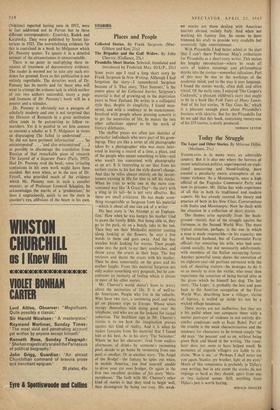STORIES
Places and People
The Brigadier and the Golf Widow. By John Cheever. (Gollancz, 25s.)
SOME years ago I read a long short story by Frank Sargeson in New Writing. Although I had
forgotten the story—I remembered Sargeson
because of it. That story, 'That Summer,' is the centre piece of his Collected Stories. Sargeson's
material is that of growing-up in the depression years in New Zealand. He writes in a colloquial style that, despite its simplicity, I found man- nered, and with a tendency to be monotonous. Involved with people whose pressing concern is to get the necessities of life, he makes the two other collections appear to be the work of literary dilettantes.
The shorter pieces are often just sketches of particular individuals who were part of his grow- ing-up. They are like a series of old photographs taken by a photographer who was more inter- ested in leaving a record of a time, a place, and of the people who meant something to him—and who wasn't too concerned with photography as an art. It is interesting to see that from his earliest stories to his last the style doesn't change. And that he relies almost entirely on the invent- iveness existing in life for him to tell his stories. When he tries to write one in the more con- ventional way like 'A Great Day'—the story with a sting in its tail—he is not very effective. But these are small criticisms: He has Made some- thing recognisable as Sargeson from his material —which is about all one can ask of a writer.
His best story is 'An Attempt at an Explana- tion.' How when he was hungry his mother tried to pawn the family Bible. Not being able to, they go to the park, sit on a bench, take in the sun. Then they see their Methodist minister coming along looking at the flowers; he says a few words to them and goes away. And the boy watches birds looking for worms. Then people come into the park to eat their sandwiches, and throw away the crusts in their bags. The boy retrieves and shares the crusts with his mother. Then he does somersaults on the grass and his mother laughs. From this material Sargeson not only makes something very poignant, but he con- centrates an intensity of feeling which is absent in most of his other stories.
Mr. Cheever's world doesn't have to worry about the necessities of life. It is of well-to- do Americans. People who live in the suburbs. Who have two cars, a swimming pool and who go on pleasure trips to Europe. Whose wives occupy themselves with doing good over the telephone, and who are on the lookout for casual seduction. The healthiest sign in Mr. Cheever's stories is to see how the imagination presses against this kind of reality. And it is when he makes fantasies from his material that I found him at his best. As in his story The Swimmer.' Where he has his character, tired from endless afternoons of drinks by someone's swimming pool, decide to go home by swimming from one pool to another. Or in another story, 'The Angel of the Bridge'—the fantasy he spins out when. in mobile America, you find yourself unable to drive your car over bridges. Or again in the first two excellent sketches of ,his story 'Meta- morphoses.' The fatilt with Mr. Cheever's other kind of stories is that they tend to begin well, then disintegrate by being too cosy. His weak-
est stories are those dealing with American tourists abroad, mainly Italy. And when not working his fantasy line, he seems to have trimmed, his craft to provide very readable but essentially light entertainment.
With Pirandello I had better admit at the start that I can't share Professor May's enthusiasm for Pirandello as a short-story writer. This makes his lengthy introduction—where he reads all sorts of hidden meanings and philosophical depths into the stories—somewhat ridiculous. Part of this may be due to the workings of the academic mind, and to the way it uses language. I found the stories wordy, often dull, and often trivial. Of the early ones, I enjoyed 'The Cooper's Cockerels,' a pleasant children's story that ought to be in a book like Folk Tales of Many Lands. And of his last stories, 'A Day Goes By,' which is a pleasant enough piece about Pirandello's business with identity. But for the Pirandello fan let me add that this book, containing twenty-one of his 233 stories, is nicely produced.
NORMAN LEVINE






























 Previous page
Previous page